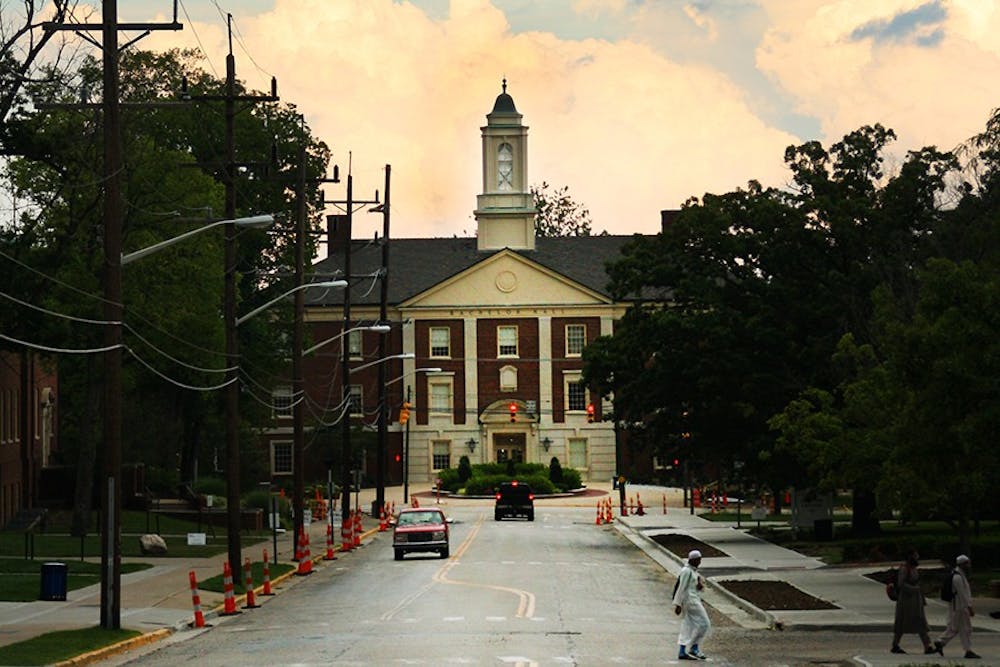By Emily Williams, For The Miami Student
Photo by Lauren Olson, Photography Editor
Ivan Grek, graduate student at Miami and native of St. Petersburg, summed up Russia's current perception of America in a few key words.
"All they think about is money, we are thinking about a great thing, in great Russia," he said.
Sept. 12, students, staff members and other guests filled every seat in Room 111 of Harrison Hall, leaving some to stand in doorways or perch on steps, to listen to Russia and Ukraine: Inside Perspectives, a panel discussion featuring Grek and four Miami staff members.
Primarily, this discussion of "Inside Perspectives" highlighted the misconceptions which have clouded Donetsk, Luhansk, Crimea and the surrounding areas in Eastern Europe, the complexity of the conflicts and their significance to Americans.
As both a current Miami student and citizen of Russia, Grek offered the most personal perception of Russia's involvement in Ukraine.
"For the majority of Russians it is the restoration of historical justice … the restoration of the Russian world," explained Grek.
He spoke of the rebels as "movers and shakers" who, rather than being hungry for violence, see war as a shameful event, but one worth pursuing for the sake of reclaiming a national identity which seemed to have been lost before Putin came into the presidency.
Ben Sutcliffe, an associate professor with the Havighurst Center, recalled his unsettling visits to Russia during that pre-Putin era of suffering nationalism.
"I remember going to Russia during the 1990s seeing drunk policemen on the subway with their guns - absolutely terrifying," he said.
Sutcliffe also pointed out another contributing factor to Putin's ability to rally a formerly shamed nation behind his recent aggressive efforts.
Enjoy what you're reading?
Signup for our newsletter
"Although Russia in geography is the largest country, it's constantly the victim," he said.
During his most recent visit, everyone with whom he spoke, from his taxi driver to a feminist land-lady, to a political neurosurgeon, mentioned Ukraine and their unwavering support for Putin. Not only do Russians feel a need to regain their authority as powerful nation, but there is also a collective feeling of entitlement to such a redemption, he explained.
Lisa Skryzhevska, professor of Geography at Miami's Hamilton campus, cited the Russian media as the driving force behind this national mentality.
"When I went to Russia, information from the media was completely upside down," she said.
Neringa Klumbyte, an anthropology professor specializing in Eastern Europe and Lithuania, likewise agreed with the importance of the media's role in the progression of these conflicts.
"That viewpoint is being artificially prolonged and intensified by the complete Russian control of the media," she said.
Sutcliffe also commented on the omnipresence of Putin's media control.
"You're simply bombarded with this pro-Putin, pro-separatist, anti-Ukraine, anti-West, anti-NATO tirade that is ongoing," Sutcliffe said.
One student, in regards to the image which our own media has developed of Russia's infamous leader, asked the panel whether our perception of Putin is too radical or fairly legitimate.
In response, Sutcliffe further outlined the motivation behind Putin's genuinely devoted electorate. The Russians had been faced with the same question every democratic government must face - Do we want social stability or freedom?
"Historically, freedom loses, every single time," he said.
So where do we as Americans, known to be defenders of liberty and democracy, stand in this conflict?
Grek and Sutcliffe both addressed this issue, highlighting the hypocrisy that Russians see in American criticism of Russia's role in the violence in light of our past aggressive actions in Iraq and the surrounding areas of the Middle East.
"Clearly America has lost the moral right to critique other people for their aggression," Sutcliffe said. "Unfortunately, all these things are really helping Putin."
As for the status of the cease-fire, just this Sunday heavy fighting broke out in northern Donetsk, killing at least six people, the most large-scale violence since the uneasy agreement established on Sept. 5. Considering Sunday's events and the very tentative nature of the cease-fire, every member of the panel recognized the potential for further, if more serious conflict.
"War may happen every day," said Klumbyte.
One thing is for certain; if any further violence arises, the world will be looking to America to decide how to take action. Up to this point, NATO has focused its efforts on placing sanctions on Russia and could choose to continue with that plan if necessary. Grek said he believes doing so would only perpetuate Russia's view of America as materialistic and encourages Russians to proudly provide their country with more Russian goods and fewer American imports.
Another aspect of the conflict on which every panelist agreed was the complex nature of this crisis. Both sides are guilty but are also each supported by idealistic, motivated individuals with an ultimate goal in mind, one which they genuinely believe to be the best.
As Sutcliffe said on the issue, "No one is sacred. No one is innocent."
For any students interested in learning more about Russia and Eastern Europe, the Havighust Center for Russian and Post-Soviet Studies is holding a colloquia series, "Security, Sovereignty, and Power-Eurasia," on Mondays from 11:30 to 12:50 in Room 209 of Harrison Hall Sept. 15 through Nov. 10 to cover topics ranging anywhere from the KGB to the Romanian Truth Commission.




